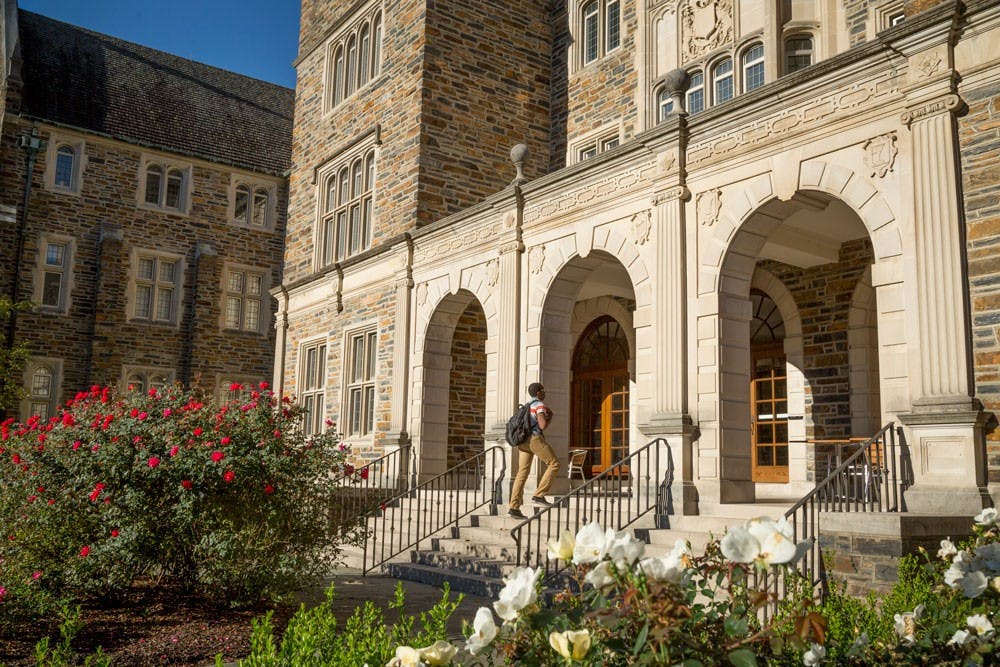Nearly two years after President Vincent Price committed Duke to new plans to confront systemic racism and inequality, the Racial Equity Advisory Council has released its first year report to the Duke community.
In a Wednesday email to all Duke staff, faculty and students, the co-chairs of the council provided updates on the progress the four subcommittees have made in the past year and outlined their anticipated work for the next year.
The REAC is an advisory body to the University’s executive leadership “for the purpose of operationalizing and coordinating the key concepts articulated by the President in his Juneteenth message on anti-racism,” according to the REAC's website.
The email stated that Duke has an obligation to “actively dismantle” sustaining impacts of the racist legacy that resulted from “our location in the American South and our history as an institution that systematically excluded Black Americans from the opportunity to learn and teach at Duke until the 1960s.”
Co-chairs provided updates from REAC's four subcommittees: Communications, Campus Climate and Assessment, Education, and Infrastructure and Politics.
Communications Subcommittee
The Communications Subcommittee, co-chaired by Mark Anthony Neal, James B. Duke distinguished professor of African and African American studies, and Rob Odom, chief marketing and communications officer and vice president of Duke University Health System, is responsible for helping to create “transparency and awareness of insights gleaned” from both the 2021 Diversity, Equity and Inclusion Climate Survey and Duke’s response.
The email stated that the subcommittee has five major areas of focus for the next year, including gathering personal stories on the lived experiences of Duke community members, updating the Racial Equity website, defining the relationship between “advancing racial equity and Duke Values,” creating and managing feedback channels to “support the resolution of feedback and concerns related to race and racial equity,” and establishing a calendar to communicate racial equity work.
Campus Climate and Assessment Subcommittee
The Campus Climate and Assessment Subcommittee, co-chaired by Sherilynn Black, associate vice provost for faculty advancement, and Professor of Statistical Science Merlise Clyde, was responsible for assisting with the distribution of the climate campus survey.
The survey was designed to “identify areas of concern and priorities as we move forward in our racial equity work,” according to the campus survey website.
“The results of our first Climate Survey on Diversity, Equity and Inclusion reinforce the importance of addressing challenges facing Black and other underrepresented members of our community, particularly with regard to hiring, opportunities for professional growth and advancement and their lived experiences on campus,” the email read.
The REAC plans to “repeat and refine” the survey in the coming years to continue to monitor progress and “hold administrators accountable for creating a more welcoming, supportive and just environment now and into the future,” the website read.
Additionally, the Campus Climate and Assessment Subcommittee worked with the Office for Faculty Advancement and the Office for Institutional Equity to conduct two full-day retreats for leaders within the administrative and academic spaces to “engage in a ‘deep dive’ with the institutional climate data,” the email stated.
The focal points for the Campus Climate and Assessment Subcommittee in the second year include cataloging “survey instruments” developed locally to share with Duke leaders, developing a “best practices” manual for survey development, developing and conducting analyses of pay equity, including examining retentions and promotions, and creating a toolkit to “assist local leaders in translating survey data into measurable actions, including assistance with interpreting survey results while considering local context.”
Education Subcommittee
The Education Subcommittee, co-chaired by Leigh-Anne Royster, assistant vice president for diversity, equity, and inclusion in the Office for Institutional Equity, and Charmaine Royal, Robert O. Kehane professor of African and African American studies, is responsible for “understanding and improving” how racial equity is integrated into educational spaces. In the first year, the subcommittee worked on understanding what opportunities exist on campus to learn about issues surrounding racial equity.
In the upcoming year, the subcommittee plans to design a tool for “soliciting information: from departments, create a database of “educational activities Duke-wide” that focus on racial equity and anti-racism and brainstorm strategies to engage each school within Duke to consider how its curriculum engages with “racial equity, anti-racism and racial liberation.”
Infrastructure and Policy Subcommittee
The fourth subcommittee, the Infrastructure and Policy Subcommittee, co-chaired by Kimberly Hewitt, vice president for institutional equity and chief diversity officer, and Abbas Benmamoun, vice provost for faculty advancement, is responsible for understanding the “capacity and structural support for the various strategic initiatives designed to advance racial equity and make recommendations to support them.”
In the first year, this subcommittee worked to calculate the progress made on racial equity goals throughout Duke and identify responses to the initial survey that raised “concerns about salary equity.”
In the coming year, the Infrastructure and Policy Subcommittee will focus on applying the Duke Annual Report on Racial Equity, collaborate with the Climate and Assessment Subcommittee on piloting a study on salary equity and confront concerns about advancement opportunities.
Get The Chronicle straight to your inbox
Signup for our weekly newsletter. Cancel at any time.

Kathryn Thomas is a Trinity junior and news editor of The Chronicle's 118th volume.

